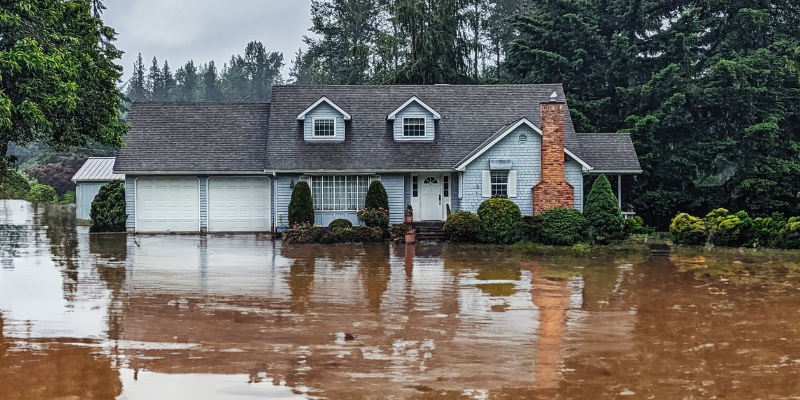
Understanding Water Damage Risks in Seattle Real Estate
Whether dealing with the Seattle real estate market or trying to sell a residence that potentially had water damage, issues come thick and fast. For sellers, the supposition of risk associated with water damage can make or break their chances in this marketing battlefield.
Just as everything hinges on perception, like sellers’ and buyers’ marketing value and visibility, flooding basements alongside Seattle’s notorious mold growth, flooded rooftops, and water leaks are just a slice of the larger picture. Every buyer and seller must be on the same line regarding the perception of whether property value is likely to rise in the future.
Increased water damage poses vulnerabilities to mildew and mold, which are detrimental to structural integrity. In this case, as with all property inspections and maintenance, checking for issues is just as critical as making repairs when listing or, in this case, selling the property.
Documenting repairs and highlighting improvements can reassure potential buyers. Seattle’s real estate market would benefit from more attention to how risk mitigation concerning water damage increases a property’s value.
Can I Sell a House with Water Damage?
In Seattle, the real estate market is rather cutthroat, making selling a house with water damage somewhat tricky but not impossible. This remains true, however, only when the right strategies are employed. Before anything else, it is essential to understand the scope of the water damage and whether or not repairs would need to be made to attract potential buyers.
Properly disclosing highlights concerning repairs made enhances the appeal of the property. Through upfront disclosure, trust concerning existing issues needing resolution can be garnered.
Engaging a real estate professional experienced in selling homes with water damage can provide invaluable insights into pricing strategies and marketing techniques tailored for such properties. Also, consider contacting cash buyers or investors who focus on buying properties in poor condition, since they might be more open to dealing with a home with water damage.
Sell My House can help homeowners sell a water-damaged house in Seattle, one of the busiest real estate markets in the country, by being open and dealing with concerns directly.
Guide to Selling a Property with Water Damage in Seattle, Washington

Selling a water-damaged home in Seattle can be challenging, but with the right approach, it’s entirely manageable. Follow these key steps:
- Get a Professional Inspection
– Assess and document the extent of the water damage with a qualified inspector. This builds trust with buyers and ensures transparency. - Address Minor Repairs and Prevent Further Damage
– Fix what you can and take steps to stop future issues. Professional cleaning to remove mold and mildew is crucial in Seattle’s damp climate. - Price the Home Competitively
– Research comparable sales of water-damaged properties in the area. A realistic price will attract more interest from serious buyers. - Market the Property Strategically
– Highlight any repairs, upgrades, or improvements to shift attention away from the damage. Clear, honest marketing goes a long way. - Work with a Local Real Estate Professional
– An experienced Seattle agent can provide insight into market conditions and connect you with motivated buyers.
Following these steps, you can navigate the challenges and successfully sell your water-damaged home in Seattle. Contact us to get started.
How Much Does Water Damage Affect Home Value?
Understanding how much water damage affects home value is crucial when selling a water-damaged home in Seattle’s real estate market. Water damage can significantly impact a property’s perceived and actual value.
Investor home buyers in Spokane and other cities in Washington often view water damage as a red flag. They are concerned about potential structural issues, mold growth, and future repair costs. In Seattle’s damp climate, these concerns are heightened due to the prevalence of rain and moisture.
The extent of the water damage, whether minor staining or severe structural compromise, is critical in determining the decrease in home value. On average, properties with unresolved water damage can see their market value reduced by 20% to 30%.
To mitigate this impact, sellers should consider investing in professional repairs and obtaining certifications that validate successful remediation. Highlighting recent renovations and disclosing all repair work can help reassure potential buyers and maintain competitive pricing in Seattle’s bustling housing market.
Are the Sellers of a House Liable for Repairs After the Closing?
In Seattle’s competitive real estate market, sellers of a water-damaged house often wonder about their liability for repairs after the closing. Understanding seller responsibilities is crucial for navigating the sale of a property with water damage.
Typically, once the title has transferred to the buyer, the seller’s obligations end unless specific warranties or agreements are in place. However, full disclosure of known water damage is essential to avoid future disputes and potential legal liability.
Sellers should consider obtaining a thorough home inspection and providing buyers with detailed reports on existing water issues. This proactive approach not only fosters trust but also minimizes unexpected liabilities post-closing.
By clearly outlining repair agreements in the sales contract, sellers can protect themselves from future claims while ensuring a transparent transaction process in Seattle’s unique housing market.
Do You Have to Declare Water Damage When Selling a House?

When selling a water-damaged home in Seattle’s competitive real estate market, it is crucial to understand the legal and ethical obligation of disclosing any known defects, including water damage. Sellers must declare water damage when listing their property to avoid legal repercussions and build trust with prospective cash home buyers in Tacoma and surrounding cities in Washington.
Full disclosure aligns with Washington State’s real estate regulations and aids in setting realistic buyer expectations. This is essential in a city like Seattle, where properties are quickly scrutinized due to the damp climate. Sellers can facilitate smoother transactions by transparently communicating the extent of water damage, whether from flooding, leaky roofs, or plumbing issues.
Furthermore, addressing these issues upfront might enhance buyer interest by demonstrating honesty and highlighting recent repairs or improvements to mitigate the damage. In short, declaring water damage is a legal requirement and an effective strategy for maintaining integrity and fostering a successful sale in Seattle’s dynamic real estate landscape.
What Happens If Sellers Don’t Disclose Water Damage?
When sellers in Seattle’s real estate market fail to disclose water damage when selling a house, they expose themselves to significant legal and financial risks. Washington state law mandates that sellers provide a comprehensive disclosure statement, including known issues such as water damage.
If sellers neglect this obligation, buyers may discover the undisclosed water damage post-purchase, leading to potential lawsuits for misrepresentation or fraud. In addition to legal repercussions, failing to disclose water damage can severely damage a seller’s reputation and undermine trust with future buyers or agents.
Moreover, the costs of repairs and potential compensation claims can far exceed the expenses of upfront transparency about existing water issues. To avoid these pitfalls in Seattle’s competitive housing market, sellers must be forthright about water-related problems and consult with real estate professionals who understand the importance of adhering to disclosure requirements.
Being honest about property conditions protects against liability and fosters goodwill and smoother transactions in the long run.
Causes and Effects on Property Value of Water-damaged
Water damage can significantly impact a property’s value, especially in Seattle’s real estate market, where rain is frequent. In many cases, prolonged moisture exposure can also lead to foundation issues, which further reduce a home’s appeal and market price. Understanding the causes and effects of water damage is crucial for homeowners looking to sell a water-damaged house effectively.
Common causes include roof leaks, poor drainage systems, faulty plumbing, and inadequate waterproofing. These issues can lead to problems like mold growth, wood rot, and structural damage, which are detrimental to property value.
Potential buyers often see water-damaged homes as risky investments due to the possibility of hidden repairs and ongoing maintenance costs. Additionally, visible signs of water damage can deter buyers or lead them to negotiate aggressively on price.
Sellers must proactively assess the extent of the damage and consider professional inspections or repairs to mitigate concerns. By addressing these issues head-on, sellers can better position their property in Seattle’s competitive housing market and potentially improve its resale value despite previous damage.
What Is the Average Payout for Water Damage Claims?

Understanding the average payout for water damage claims can be crucial when selling a water-damaged home in Seattle’s real estate market. Homeowners who face water damage often seek compensation through insurance claims, and knowing the typical payout can help set realistic expectations. Additionally, reviewing Expert Tips For Selling A House With Title Issues ensures you address potential ownership complications that may arise during your sale process.
On average, water damage claims can vary widely depending on the extent of the damage and the specific insurance policy terms. However, estimates suggest that payouts typically range from $2,000 to $15,000.
This variation depends on factors such as the cause of the water damage (e.g., plumbing leaks or natural flooding), the severity of structural impact, and any additional mold remediation required. For Seattle homeowners, it’s essential to consider local climate patterns that might affect these averages.
Engaging with a knowledgeable real estate professional familiar with Seattle’s market conditions and insurance intricacies can provide valuable insights and strategies to maximize your home’s sale price despite past water issues. By leveraging this information effectively during negotiations with potential buyers, sellers can better navigate Seattle’s competitive real estate landscape even when dealing with previous water-related challenges.
Need to sell your home fast? Sell My House offers fair cash deals, no repairs needed, and a hassle-free process. Call (253) 289-3773 for a no-obligation offer today!
| SPACE | IBUYERS | FLOODING | FLOODS | REAL ESTATE COMPANY | INSURANCE |
| INSURANCE CLAIMS | INSURANCE COMPANIES | HOMEOWNER’S INSURANCE | HOMEOWNERS INSURANCE | HOME INSURANCE | BASEMENT |
| CRAWL SPACES | MOLD PREVENTION | MOLD REMEDIATION | GUTTERS | DRYWALL | PEST |
| INFORMATION | HUMIDITY | HOME INSPECTORS | FOUNDATION | FORECLOSURE | FORECLOSURE SALE |
| REALTOR | MORTGAGES | MORTGAGE LENDERS | MONEY | KNOWLEDGE | FLOOD INSURANCE |
| FEE | TERMITE | HOMELIGHT | DEHUMIDIFY | DEHUMIDIFIERS | |
| U.S. | HURRICANES | RUSTING | RAINFALL | POLICY | PIPES |
| NATURAL DISASTERS | MARKET VALUE | LITIGATION | KIND HOUSE BUYERS | HEALTH | HEALTH HAZARDS |
| HAZARD | GROUNDWATER | FLAT ROOFS | DEBRIS | LENDERS | DOMESTIC WATER |
| FAUCETS | ROOM | REAL ESTATE TRANSACTION | REAL ESTATE INVESTMENT | HOMEBUYERS | MILDEW |
| ATTORNEY | INSURANCE POLICIES | INSURANCE POLICY | INSPECTOR | HVAC | FSBO |
| FOR SALE BY OWNER | FLOORING | WIRING | DOOR | DAMAGES | CONSTRUCTION |
| COMMUNICATION | INSULATION | BROKER | BLOG |
